Greece is well-known for its delicious cuisine, historical history, and beautiful beaches. This location combines education with adventure. Greece offers something for every age group, from young adventurers to families seeking a cultural experience. Here, we’ll look at interesting Greek facts that will pique everyone’s interest.
Study Greek democracy and the Olympic Games. There are many historic finds in this land. Greece is a wonderful place for children to travel because each visit offers a fresh narrative. Greek gods, valiant deeds, and magnificent architecture will all be mentioned. Furthermore, Greek cuisine is a Zeus-provided feast!
Children, prepare yourselves for an exciting adventure. We will discuss Greece information for children and the importance of traveling there. You will discover the splendor of the Aegean Sea and ancient tales. Talk about these interesting facts with your loved ones!
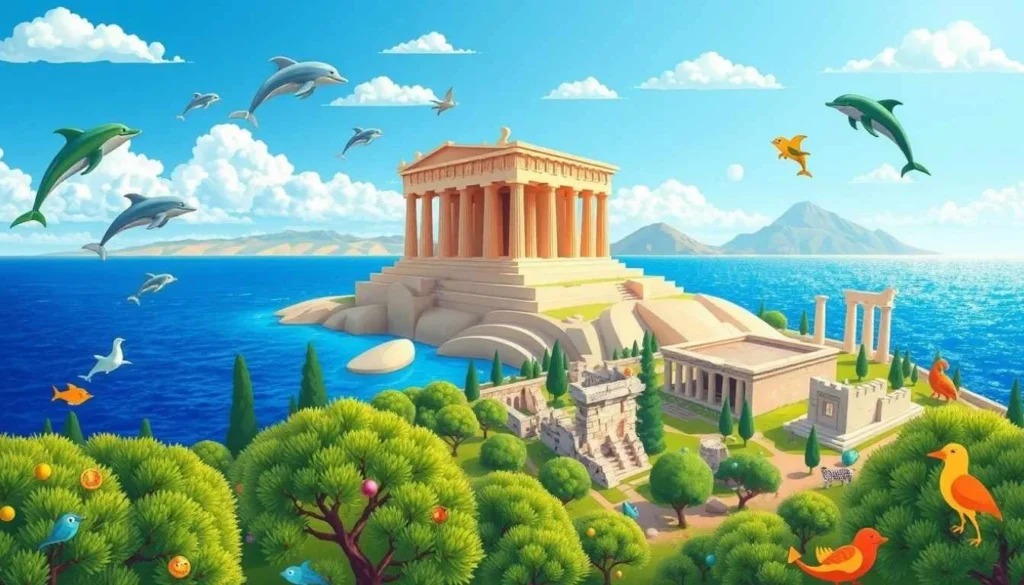
Key Takeaways
- Explore the fascinating legends surrounding ancient Greece and its importance on a worldwide scale.
- Introduce the myths that influenced Greek mythology to children.
- Learn about the Acropolis’ historical significance and the reasons it’s a must-see.
- Discover the breathtaking islands of Greece and why they are a family’s dream come true.
- Discover Greek hospitality and the reasons it is considered one of the friendliest nations in the world.
- Explore the mouthwatering realm of Greek food, a genuine Mediterranean gem.
- Study Greek mythology, which still has an impact today.
Ancient Greece: Cradle of Western Civilisation
Western civilization was significantly influenced by ancient Greece. It produced significant contributions to philosophy, government, and the arts. Our contemporary world was shaped in many ways by these contributions.
The Legend of the Olympic Games
In 776 BC, Olympia hosted the first Olympic Games. They displayed the ancient Greeks’ passion for athletics and competitiveness while also paying homage to Zeus. The thrill of those games is still evoked by Olympia’s sites today.the excitement of those games.
The Birth of Democracy
In 776 BC, Olympia hosted the first Olympic Games. They displayed the ancient Greeks‘ passion for athletics and competitiveness while also paying homage to Zeus. The thrill of those games is still evoked by Olympia’s sites today.nt Greece.
Inventions That Changed the World
The ancient Greeks had a lot of ideas. They invented the watermill, the Antikythera device, and an early computer. They were highly developed for their period, as seen by these inventions.
In conclusion, the era of Ancient Greece was one of great invention and culture. They established democracy and the Olympic Games. Their concepts continue to influence our world today.
| Concept | Origin | Impact on Modern World |
|---|---|---|
| Olympic Games | Olympia, 776 BC | Inspired modern Olympic games, fostering international cooperation and sporting excellence. |
| Democracy | Athens, Ancient Greece | Foundation of modern democratic governments. |
| Antikythera Mechanism | Ancient Greece | Early example of an analogue computer, representing advanced ancient Greek technology. |
| Watermill | Ancient Greece | Revolutionized water management and usage in agriculture and building. |
Greece Is Home to a Pantheon of Myths and Heroes
Greek mythology’s diverse fabric provides insight into prehistoric beliefs. It narrates tales of courage, exploration, and intrigue. These stories, which are replete with heroes, gods, and goddesses, continue to enthrall people today. The adventures of Hercules, Zeus, Poseidon, and the city of Athens are all examined.
The Tales of Zeus and Poseidon
Zeus, renowned for his thunderbolts, is the absolute ruler of the gods. The main focus of these tales is his conflict with the sea deity Poseidon. Their tales demonstrate the sea’s and sky’s might and their influence on both people and gods.
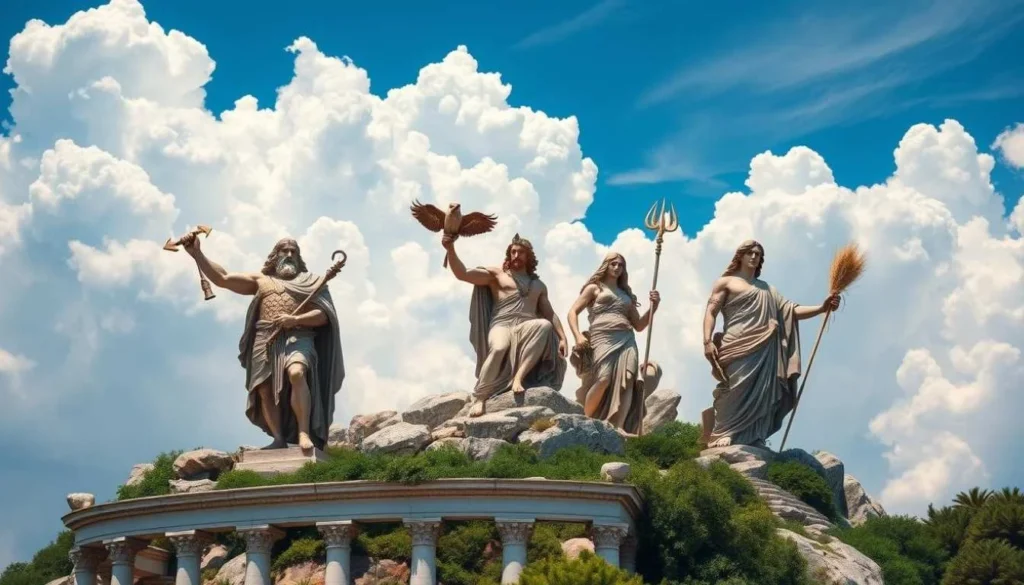
Adventures of Hercules and The Odyssey
Hercules‘ twelve labors, which put his bravery to the test, are what made him renowned. The Odyssey describes Odysseus‘ return trip following the Trojan War. The significance of tenacity and the search for home are emphasized in both tales.
Athena: The Goddess Who Gave Athens Its Name
Athens is patronized by Athena, the goddess of knowledge. She was so appreciative of its commitment that she called the city. In recognition of her contribution to the wealth and safety of Athens, the Parthenon was constructed. Numerous Greek myths are inspired by Athena’s benevolence and knowledge, which also represent Athens’ cultural legacy.
| Character | Domain | Significant Tales |
|---|---|---|
| Zeus | Sky, Thunder | Rule over gods, Battle with Titans |
| Poseidon | Sea, Earthquakes | Creation of horses, Rivalry with Athena |
| Hercules | Heroism, Strength | 12 Labors, Battle with the Nemean Lion |
| Odysseus | Endurance, Ingenuity | The Trojan Horse, Journey back to Ithaca |
| Athena | Wisdom, Warfare | Giving Athens its name, Patronage of heroes |
The Acropolis of Athens: A Timeless Landmark
Perched on a rocky outcrop above the city lies the Acropolis of Athens. It displays the height of Greek architecture and civilization. As the patroness of the Athenians, the location, which is well-known for the Parthenon, celebrates Athena, the goddess of knowledge.
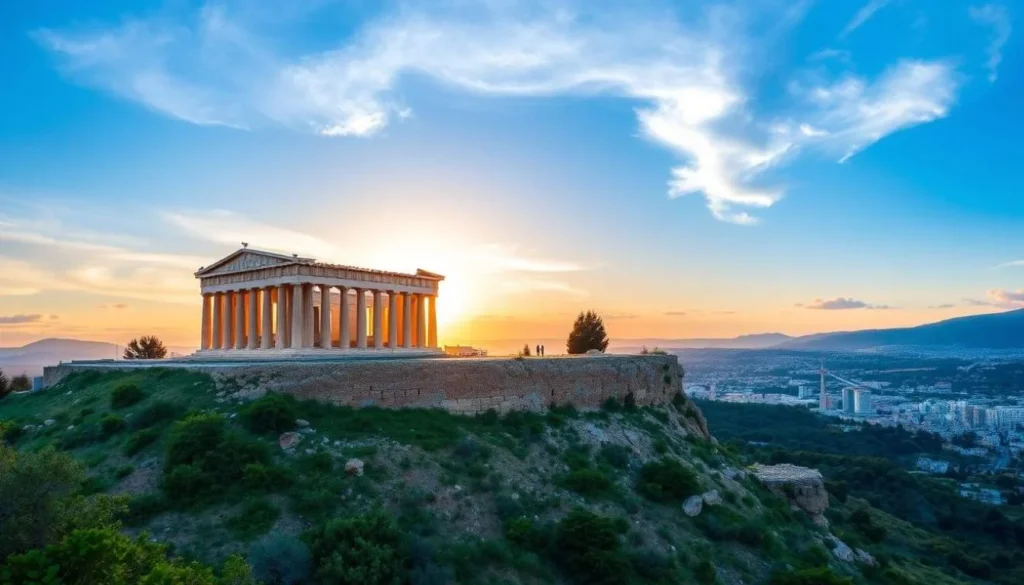
From its historic theaters, the Acropolis narrates stories. It was in these theaters that drama began and thrived. They emphasize the rich cultural heritage of Athens, as well as its enduring love of art and community.
The Parthenon: A Tribute to the Goddess of Wisdom
Even now, people are moved by the Parthenon’s beauty. It displays grandeur and symmetry with its huge structure and Doric columns. Built in honor of Athena, the temple demonstrates her significance in Athens’ culture and her impact on welfare, war, and wisdom.
Ancient Theatres and Their Legendary Performances
The Odeon of Herodes Atticus and other historic theaters surrounding the Acropolis have been there for thousands of years. To connect the old with the modern, they continue to host shows. People shared ideas, politics, and drama in these theaters, which served as more than just venues for viewing performances. They demonstrate that Western culture originated in Athens.
Discover the Beauty of Greek Islands and Coastline
Along the coast, Greece’s islands resemble sun-kissed gems. Mykonos and Santorini are well-known for their natural beauty. Views of the Mediterranean and Aegean Seas are even more breathtaking.
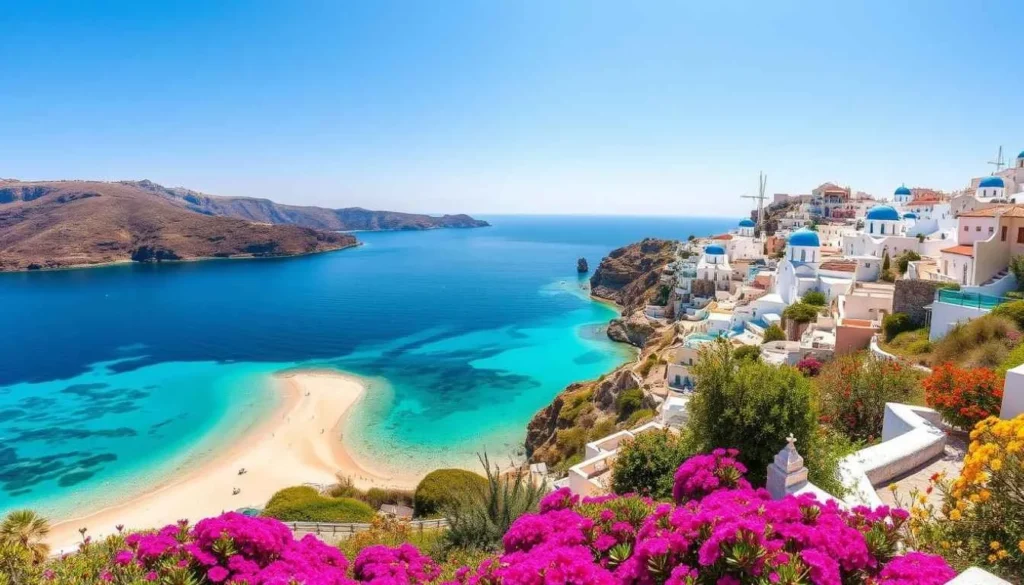
Not only are these locations stunning. Their diverse civilizations also draw tourists from all around the world. Let’s have a look at some of the most beautiful islands.
Santorini: A Volcanic Paradise
The stunning sunsets and cliff-top towns of Santorini are well-known. The cause of it is a volcanic eruption. The contrast between the island’s untamed beauty and the serene seas of the Aegean Sea is stunning.
Mykonos: The Island of Vibrant Lifestyle
Mykonos is full of vitality. It is renowned for both its stunning beaches and its nightlife. The island is a great place to have fun and unwind because of its blend of historic architecture and modern living.
| Feature | Santorini | Mykonos |
|---|---|---|
| Landscape | Volcanic cliffs, stunning sunsets | Golden sand beaches, azure waters |
| Activities | Wine tasting, historical tours | Beach parties, luxury shopping |
| Atmosphere | Romantic, serene | Energetic, vibrant |
Greece Is One of the World’s Most Friendly Places
The kindness of the Greek people greets you as soon as you arrive in Greece. It is renowned worldwide for its friendly attitude. Greeks are renowned for being open and kind and for having a welcoming culture. Whether in a small village or a bustling city, Greeks make guests feel completely at home.
The warmth of the Greek people stems from their deep ties to Greek customs and communal beliefs. There is happiness and inclusivity at public celebrations and family get-togethers. This lifestyle enhances the experiences of tourists and demonstrates the Greeks’ eternal hospitality.
- Generational instruction in hospitality and kindness
- Celebrations in the family and public that are open to all
- Pleasant and giving encounters on a daily basis
This table illustrates how the hospitable Greek people engage guests in their vibrant Greek customs. It displays a deeply ingrained culture of friendliness and hospitality:
| Cultural Activity | Description | Impact on Visitors |
|---|---|---|
| Traditional Greek Festivals | Festivals full of dance, music, and communal meals. | Visitors feel an instant sense of belonging and joy. |
| Local Marketplace Interactions | Greeks often share stories and offer tips to visitors. | Enhances the travel experience with personal touches and warmth. |
| Family-Run Tavernas | Meals served with a hearty welcome, often including extra treats or drinks on the house. | Leaves lasting impressions of generosity and friendliness. |
Greece is among the friendliest places on earth because of its authentic spirit. Each encounter turns into an emotional one. Greece is a great example of a welcoming culture and the generosity and friendliness of its people.
Fun Facts About Greece: Mouthwatering Greek Cuisine
Discovering Greek food reveals a vast array of delectable delicacies. These foods are essential to Mediterranean cuisine. Greek cuisine transports you through time and is renowned for its diversity and health advantages..

A Taste of Mediterranean Flavors
Greek food focuses on the Mediterranean tastes that are popular worldwide. It uses beans, grains, fish, and fresh vegetables. Greek olive oil enhances the flavor and health benefits of these components.
The Secret Behind the Greek Olive Oil
Greece’s olive oil is well-known. This oil’s excellence derives from the nation’s old olive trees. This oil adds a rich flavor and texture, making it indispensable in Greek cooking.
In Greek culture, the olive tree represents calm and wisdom. Greek culture places a lot of emphasis on it, demonstrating the relationship between food, history, and the land.
- Olive oil and savory layers enhance moussaka.
- Souvlaki marinated in Greek olive oil with herbs
- Tzatziki is a cool concoction of yogurt, cucumber, and garlic that is drizzled with olive oil.
Discovering Greek food allows you to delve into the rich history and culture of Greece. It is a tale of people, places, and the olive trees that have long guarded them; it is more than just food.er them for ages.
Greek Mythology: Stories That Have Inspired Centuries
Studying Greek mythology reveals a wealth of tales that are fundamental to Western culture. It has heroic quests, mythical monsters, and Olympus. These tales have had a profound impact on contemporary culture, from literature to the arts, in addition to providing entertainment.
Mount Olympus: The Playground of the Gods
Home to the Greek gods, Mount Olympus towers over the Greek highlands. This mountain represents the might of Zeus and his gods and is a cultural icon. Humans have been enthralled by Mount Olympus myths for generations because they depict the gods’ intricate lifestyles and epic tales.
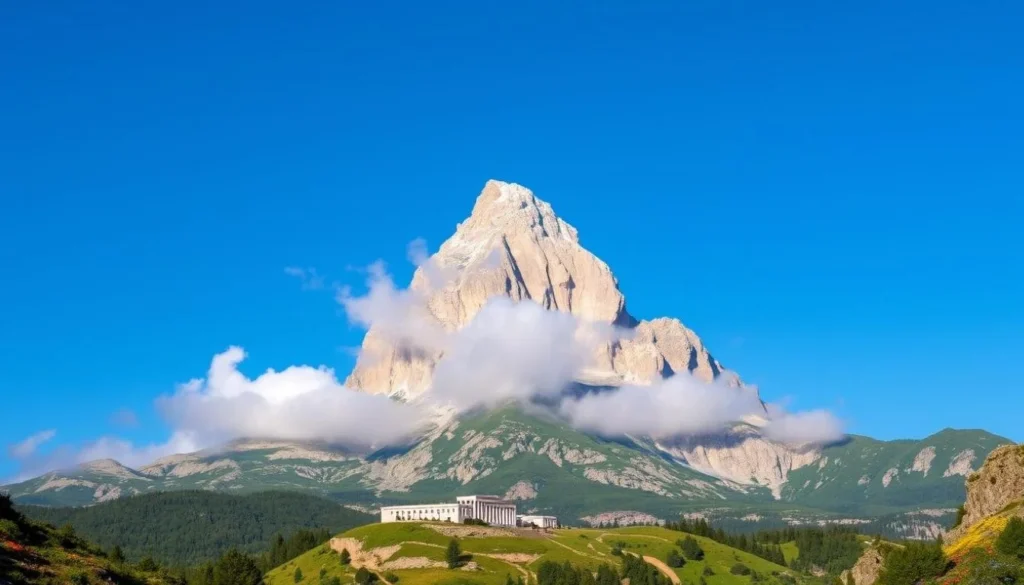
Mythical Monsters and Heroic Quests
Gods and legendary creatures that heroes must battle in their valiant pursuits abound in Greek mythology. We learn courage, wit, and tenacity from these stories. These are morally instructive and inspirational foundational tales. Important aspects of Greek culture include the tales of Perseus and Theseus, who vanquished Medusa and the Minotaur.
| Hero | Monster Defeated | Significance in Greek Mythology |
|---|---|---|
| Perseus | Medusa | Symbolizes overcoming seemingly insurmountable challenges. |
| Theseus | Minotaur | Represents the triumph of good over evil and cleverness over brute strength. |
| Hercules | Nemean Lion | Illustrates strength, determination, and the idea of performing seemingly impossible tasks. |
Athens Is Not Just Ancient but Alive With Culture
There is more to Athens than just ancient history. It’s a city where the modern world coexists with the old. This blend is particularly evident in the old town districts of Plaka and Monastiraki. Athens, from the Acropolis Museum to cafés and street art, is constantly evolving.
Modern Delights in Athens’ Old Town
Athens’ old town is a hub of both contemporary and ancient culture. Its cobblestone alleys are lined with stores and delicious food. Near the Acropolis Museum, this space preserves the past while showcasing the inventiveness of contemporary Athenians.
The Vibrant Streets of Plaka and Monastiraki
Plaka and Monastiraki are renowned for their history and vibrant atmosphere. Near the Acropolis, Plaka boasts a distinctive street life that includes cuisine, art, and music. Monastiraki juxtaposes modern stores and markets with historic structures, blending the old and the contemporary.
| Athens District | Key Attractions | Experience |
|---|---|---|
| Plaka | Acropolis views, traditional tavernas, Byzantine churches | Walking through Plaka feels like a leisurely stroll through history, enriched with gastronomic stops and picturesque scenes ideal for photography. |
| Monastiraki | Flea market, Hadrian’s Library, vibrant cafés | Monastiraki is a melting pot of ancient and modern, offering energetic bazaars and tranquil spots for coffee with views of Athenian ruins. |
Greece’s Natural Splendor Calls for Adventure
Greece is an unparalleled destination for adventurers of all stripes. Huge national parks and immaculate beaches offer tranquility and salty air. Greece’s shoreline, with its picturesque scenery and cultural secrets, is a call to adventure.
National Parks and Pristine Beaches
Nature enthusiasts will find bliss in Greece’s national parks. They have rocky paths, verdant forests, and stunning vistas. A tranquil diversion from the bustle of the city is the parks.
Greece has equally beautiful beaches along its coastline. They boast pristine beaches and glistening waterways. Water sports and relaxation are perfect on these beaches.
Greece’s Underwater Secrets: Dive to Discover
For divers, Greece’s underwater environment is an exciting adventure. Caves, old shipwrecks, and a variety of marine life can all be found there. By delving into these depths, one can discover the rich undersea environment and historical mysteries.
| Location | Attraction | Type of Adventure |
|---|---|---|
| Samos National Park | Mountain Trails and Rare Wildlife | Hiking and Wildlife Viewing |
| Navagio Beach | Shipwreck and Turquoise Waters | Swimming and Snorkeling |
| The Antikythera Shipwreck | Ancient Artifacts and Marine Life | Scuba Diving |
Every location in Greece has a unique tale, whether it’s a crowded harbor or a lonely island. Adventure is in store, whether it’s diving in the Aegean Sea or hiking in the shadow of Mount Olympus. Greece not only piques your curiosity but also leaves you with priceless recollections of its breathtaking natural beauty.
Greece: A Land of Endless Learning and Fun
Every family vacation to Greece combines informative travel with fun family activities. Each time you visit Greece, you can easily learn more about the country. Every tour is an opportunity to have fun and learn about Greek culture, which is captivating for both children and adults.
Participating in interactive courses on Greek customs or touring ancient sites are also distinctive experiences. Greece is where history is brought to life. It demonstrates how contemporary society ties into its historical foundations.
Greece is full of interesting historical details that make every visit unique. Families can travel to the islands and the mainland. Through years of practical experience, they gain knowledge.
| Activity | Educational Benefit | Location |
|---|---|---|
| Ancient Ruins Exploration | Learning about historical architecture and ancient Greek society | Athens, Delphi, Knossos |
| Mythology Workshops | Understanding Greek myths, gods, and heroes | Crete, Olympia |
| Culinary Classes | Exploring Greek cuisine and learning about Mediterranean diets | Santorini, Mykonos |
- Engaging archeological sites promote experiential learning
- Greek culture is better understood through guided cultural tours.
- Nature paths that describe Greece’s wildlife and plants
Families return to Greece every year because of its allure. Every trip offers fresh experiences and revelations. Families looking to have fun and learn should definitely consider Greece.
Conclusion
The history of Greece, the cradle of Western civilization, is fascinating to people of all ages. There are many world heritage sites in the area, beckoning adventurers and history buffs. Every location in Greece, from charming villages by the Aegean Sea to myth-filled mountains, beckons you to learn about its past and culture.
Tales about gods and heroes, such as Hercules, are still honored today because the ancient Greeks loved to tell them. These tales instill courage and tenacity in us.
Greece is like entering a huge, live museum where the ancient and the modern collide. Every island has a story to tell, and the sea has been silently observing history for millennia. Enjoy the coziness of a Greek taverna or gaze out over the seas Hercules may have traversed. Greece is an educational, adventurous, and joyful location where its people and landscapes bring history to life.
Ancient wisdom and contemporary charm combine in a distinctive way in Greece. New generations of storytellers and adventurers are inspired by the spirit of Greece, which permeates everything from the summits of Olympus to the azure Aegean Sea. Take advantage of this opportunity to create new memories and contribute to the ancient Greek tradition. The famous landscapes of Greece await you on your own tour.
FAQ
What are some fun facts about Greece for kids?
Greece is the birthplace of the ancient Olympic Games. It is filled of legends and mythology and contains thousands of islands. The Acropolis and other historical sites are seen. For children, Greek culture is fascinating since it has influenced language, politics, and the arts.
Can you tell us more about Ancient Greece and its importance?
The origin of Western civilization is said to have been in ancient Greece. It has produced numerous inventions, democracy, and the Olympic Games. The watermill and the Antikythera device are two examples.
Are there interesting stories from Greek mythology for children?
Greek mythology is replete with incredible tales. Poseidon is the sea deity, while Zeus is the king of the gods. Youngsters can study the Odyssey’s tales of Odysseus and heroes like Hercules. In Greek mythology, Athena, the goddess of wisdom, is also significant.
What makes the Acropolis of Athens so special?
Athens’ historic citadel, the Acropolis, is home to significant structures. Most well-known is the Parthenon. One of the UNESCO World Heritage Sites, it displays the pinnacle of Greek art.
Why are Greek islands like Santorini and Mykonos so popular?
The Greek islands are renowned for their culture, architecture, and beauty. Santorini’s sights and sunsets are well-known. Mykonos is a vibrant island with stunning beaches.
What is the cultural atmosphere like in modern Athens?
Ancient history is blended with modern Athens. There is history, museums, markets, and modern art in places like Plaka and Monastiraki. This demonstrates how vibrant and cultural the city is.
What kind of outdoor activities can you do in Greece?
There are lots of outdoor activities in Greece. You may enjoy beaches, dive to observe ruins and aquatic life, and visit national parks. Outdoor enthusiasts will enjoy it.
How does Greek cuisine reflect the country’s culture?
A significant aspect of the culture is Greek food. It makes use of classic flavors and fresh ingredients. Souvlaki and moussaka are examples of Mediterranean cuisine. A crucial component, olive oil, emphasizes the significance of the olive tree in Greek culture.
What educational value does Greece offer for families?
Families have a lot to learn in Greece. It provides cultural experiences and history. Everyone can get knowledge from visiting locations, studying myths, and engaging with customs.
Is Greece known for its hospitality?
Indeed, Greece is renowned for its warmth. Greek people are welcoming and proud of their culture. They make a deep impression on tourists.
Why is it important to learn more about Greece?
Studying Greece helps us understand Western politics, art, and society. Creative inspiration comes from its myths and history. Geographical and scientific lessons can also be learned from the nation’s landscapes.
How has Greek mythology influenced modern culture?
For millennia, pop culture, literature, and the arts have been influenced by Greek mythology. A lot of works have been inspired by stories about heroes and gods. This demonstrates how mythology continues to influence narrative.



